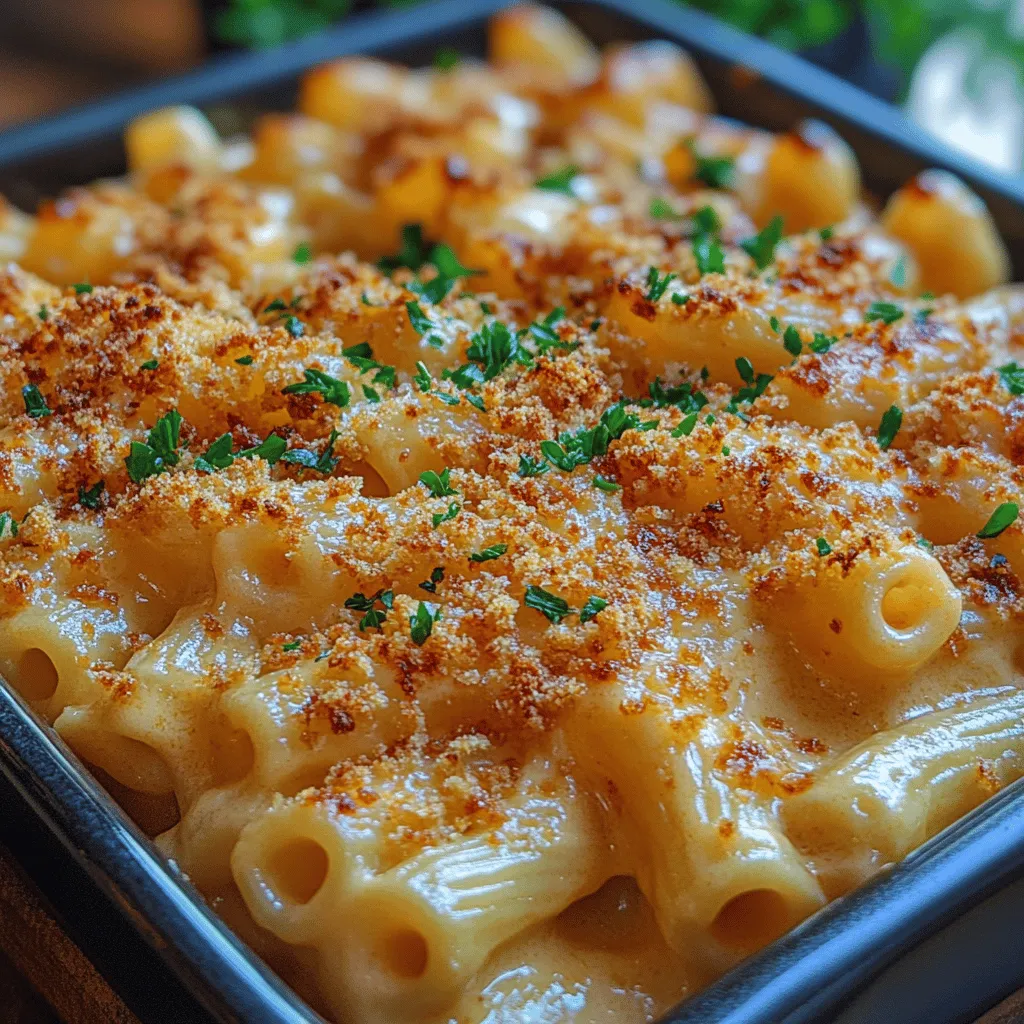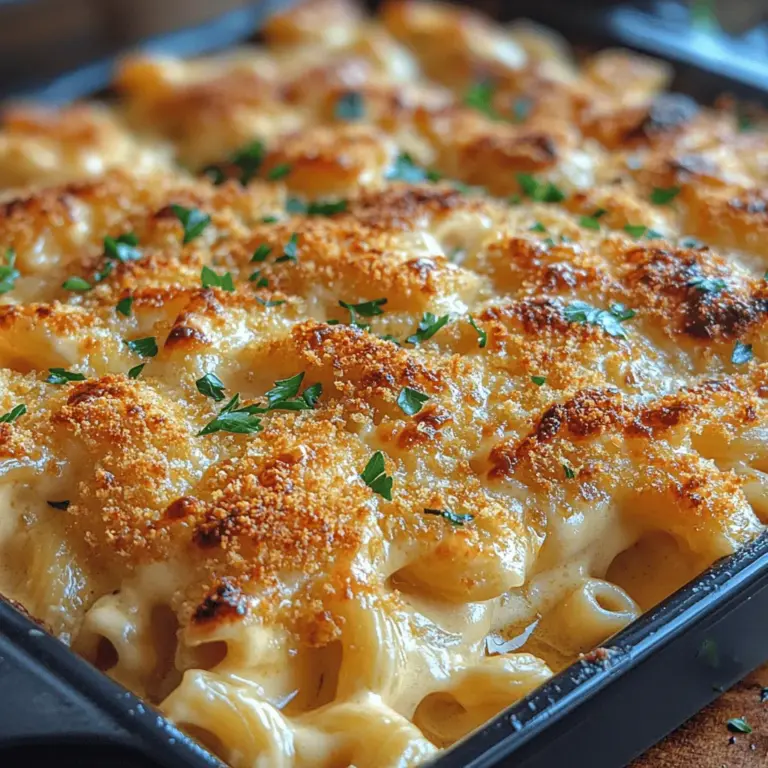Introduction to Creamy Delight Mac & Cheese with a Crunch
In the realm of comfort food, few dishes evoke as much warmth and nostalgia as a classic mac and cheese. This beloved staple has graced dining tables for generations, serving as a reminder of family gatherings and cozy evenings at home. However, the “Creamy Delight Mac & Cheese with a Crunch” takes this well-loved dish to the next level, elevating it from a simple side to a standout main course. The combination of a rich blend of sharp cheddar and Gruyère cheeses, paired with a satisfying crispy breadcrumb topping, makes this recipe an indulgent treat perfect for family dinners, potlucks, or simply indulging your cravings.
This article will guide you through every step of crafting this delectable dish, ensuring you understand not just how to make it, but also the science and flavors behind it. Whether you’re a seasoned home cook or a novice in the kitchen, you’ll find the instructions straightforward and the results utterly satisfying.
Understanding the Ingredients
The Pasta Base: Choosing Elbow Macaroni
When it comes to mac and cheese, the choice of pasta is crucial. Elbow macaroni, with its curved shape and hollow center, is the quintessential choice for this dish. Its unique form allows it to hold onto the creamy cheese sauce beautifully, ensuring each bite is a perfect balance of pasta and cheese. The texture of elbow macaroni is also ideal; it provides just the right amount of chewiness that complements the creamy sauce without becoming mushy. For the best results, opt for high-quality pasta that can withstand boiling without losing its shape.
The Cheese Medley: Sharp Cheddar and Gruyère
The heart of any great mac and cheese lies in its cheese selection, and for “Creamy Delight Mac & Cheese with a Crunch,” we recommend a delightful medley of sharp cheddar and Gruyère. Sharp cheddar brings a bold, tangy flavor that defines the dish, while Gruyère adds a layer of complexity with its nutty undertones and exceptional melting qualities. The combination of these cheeses creates a sauce that is both creamy and rich, making it essential to choose high-quality varieties. Freshly grated cheese, rather than pre-shredded options, will melt more smoothly and enhance the overall texture of your dish.
Building the Sauce: The Roux Method
To achieve the luxuriously creamy cheese sauce that characterizes this recipe, you’ll need to master the roux method. A roux is a simple mixture of equal parts flour and fat, typically butter, cooked together to form a thickening agent. This technique is fundamental in creating a smooth cheese sauce, as it helps prevent lumps and ensures an even consistency. The key to a successful roux is to cook it just long enough to eliminate the raw flour taste without letting it brown too much. When combined with milk and cheese, the roux transforms into a velvety sauce that clings perfectly to the pasta.
Flavor Enhancements: Spices and Mustard
While cheese is undoubtedly the star of mac and cheese, the supporting cast of flavors can make a significant impact. In this recipe, we enhance the cheese sauce with a blend of spices and a hint of Dijon mustard. Garlic powder and onion powder add depth and warmth, while Dijon mustard introduces a subtle tang that balances the richness of the cheese. Remember to season with salt and pepper to taste, as these simple enhancements will elevate the overall flavor profile, making your mac and cheese truly unforgettable.
Crunch Factor: Breadcrumbs and Olive Oil
No mac and cheese is complete without a crunchy topping, and for this recipe, we recommend using breadcrumbs tossed in olive oil. The crunch factor not only adds texture but also contrasts beautifully with the creamy pasta underneath. You can choose between traditional breadcrumbs and Panko breadcrumbs; the latter will give you a lighter, airier crunch. Drizzling the breadcrumbs with olive oil before baking ensures they become golden and crisp, providing the perfect finishing touch to your dish.
Step-by-Step Instructions
Cooking the Pasta to Perfection
Before diving into the sauce, you’ll need to cook the elbow macaroni to perfection. Start by bringing a large pot of salted water to a rolling boil. The salt will season the pasta as it cooks, so don’t skip this step. Add the elbow macaroni and stir occasionally to prevent sticking. Cook the pasta until it is al dente, which typically takes about 7 to 9 minutes, depending on the brand. Al dente pasta will have a slight bite to it, which is ideal for mac and cheese, as it will continue to cook further in the oven without becoming mushy.
Once the pasta is cooked, drain it well but avoid rinsing it, as this can wash away the starch that helps the sauce adhere. Set aside the pasta while you prepare the cheese sauce.
Crafting the Creamy Cheese Sauce
Now it’s time to create the creamy cheese sauce that will envelop your pasta in deliciousness. Begin by melting a generous amount of butter in a large saucepan over medium heat. Once melted, sprinkle in an equal amount of all-purpose flour, whisking continuously for about 2 minutes. This will cook the roux and remove any raw flour flavor.
Gradually introduce milk into the roux, whisking constantly to prevent lumps from forming. It’s essential to add the milk slowly, allowing it to incorporate smoothly into the mixture. Continue whisking until the sauce thickens and starts to bubble gently, which should take about 5 to 7 minutes. At this point, remove the saucepan from the heat and begin adding your freshly grated sharp cheddar and Gruyère cheese. Stir until the cheese melts completely and the sauce is smooth and creamy.
Bringing in the Flavor
To enhance the flavor of your cheese sauce, add the garlic powder, onion powder, and a teaspoon of Dijon mustard. These ingredients will bring a depth of flavor that complements the richness of the cheese. Taste the sauce and season with salt and pepper as needed, adjusting to your preference. Once the flavors are balanced, combine the cooked pasta with the cheese sauce, ensuring every piece of macaroni is generously coated.
With the pasta and sauce ready, you are now just steps away from baking this delightful dish to perfection. Stay tuned for the final assembly and baking instructions, where the magic truly happens!

Adding Spices and Cheese: Timing and Technique
To elevate your mac and cheese from ordinary to extraordinary, the timing and technique of adding spices and cheese are crucial. Begin by preparing your cheese sauce base, which typically consists of a roux made from butter, flour, and milk. Once this base is creamy and thickened, it’s time to infuse it with flavor.
Timing for Spices
Add spices such as garlic powder, onion powder, and a pinch of cayenne pepper to the roux before incorporating the cheese. This allows the spices to bloom in the fat, enhancing their aroma and flavor. Stir them in thoroughly before gradually adding your cheese. For a classic mac and cheese, sharp cheddar is a must, but feel free to mix in other varieties like Gruyère or mozzarella for added creaminess and flavor complexity.
Technique for a Smooth Cheese Sauce
When adding cheese, do so off the heat. This helps prevent the cheese from becoming gritty or separating. Gradually sprinkle in the cheese, stirring constantly until each addition melts completely before adding more. This technique ensures a smooth, velvety cheese sauce that coats your pasta perfectly.
Combining Pasta and Sauce
Techniques for Folding Pasta into the Cheese Sauce
Once your cheese sauce is ready, it’s time to combine it with the pasta. Make sure your pasta is al dente, as it will continue cooking in the oven. To avoid breaking the pasta, use a gentle folding technique.
1. Use a Large Bowl: Transfer the cheese sauce to a large mixing bowl, making it easier to combine with the pasta.
2. Add Pasta Gradually: Add the pasta in small batches, gently folding it into the sauce with a spatula or wooden spoon.
3. Coat Evenly: Ensure every piece of pasta is evenly coated with cheese sauce. This not only maximizes flavor but also ensures a consistent texture throughout your dish.
Importance of Even Coating for Maximum Flavor
An even coating is essential for flavor distribution. This ensures that each bite of mac and cheese delivers that rich, creamy taste. If some pasta is left uncoated, it may feel bland compared to the cheesy bites, affecting the overall enjoyment of the dish.
Preparing the Crunchy Topping
Steps for Mixing Breadcrumbs, Olive Oil, and Parmesan
The finishing touch to your mac and cheese is the crunchy topping, which adds texture and contrast to the creamy base. To prepare the topping, follow these simple steps:
1. Choose Your Breadcrumbs: Opt for panko breadcrumbs for a lighter, crispier texture, or use regular breadcrumbs if preferred.
2. Mix Ingredients: In a bowl, combine 1 cup of breadcrumbs with ¼ cup of grated Parmesan cheese, and drizzle in 2 tablespoons of olive oil.
3. Season It: Add a pinch of salt, pepper, and a dash of paprika for extra flavor. Mix everything until the breadcrumbs are evenly coated with olive oil and cheese.
Ensuring an Even Distribution for Optimal Crunch
For the best results, sprinkle the breadcrumb mixture evenly over the mac and cheese before baking. This ensures that every bite has that delightful crunch. Consider using your fingers to break up any clumps in the breadcrumb mixture, allowing for an even layer.
Baking to Golden Perfection
Setting the Oven Temperature and Baking Time
Preheat your oven to 350°F (175°C). Once your mac and cheese is topped with the breadcrumb mixture, place it in the oven. Bake for approximately 25-30 minutes, or until the topping is golden brown and crispy.
Signs That Your Mac and Cheese is Ready to be Served
Keep an eye on the mac and cheese as it bakes. You’ll know it’s ready when the edges are bubbling, the top is golden, and a delicious aroma fills your kitchen. Let it cool for a few minutes before serving, as this allows the cheese sauce to set slightly.
Serving Suggestions and Pairings
Ideal Accompaniments
To create a well-rounded meal, consider serving your creamy mac and cheese with complementary side dishes. Fresh greens, such as a simple arugula salad with a light vinaigrette, help balance the richness of the dish. Alternatively, roasted vegetables like Brussels sprouts or asparagus add a nutritious element.
Beverage Pairings for a Well-Rounded Meal
For beverage pairings, a crisp white wine, such as Sauvignon Blanc, can cut through the creaminess of the mac and cheese. If you prefer non-alcoholic options, try serving it with sparkling water infused with lemon or a refreshing iced tea.
Presentation Tips
Creative Ways to Serve and Garnish Your Dish
Presentation plays a vital role in enhancing the dining experience. Serve the mac and cheese in individual ramekins for a charming touch, or use a large, attractive baking dish for family-style serving. For garnishing, sprinkle freshly chopped herbs like parsley or chives over the top for a pop of color and added freshness.
Importance of Visual Appeal in Enhancing the Dining Experience
A visually appealing dish can elevate your meal and stimulate appetite. The contrast of creamy cheese against the golden topping, along with fresh herbs, creates an inviting presentation that will impress your guests.
Nutritional Insights
Analyzing the Ingredients
Understanding the nutritional content of your mac and cheese can help you make informed decisions. Each serving typically contains a good balance of carbohydrates from the pasta, protein from cheese, and fats from butter and cheese. A standard serving may provide around 400-500 calories, depending on the specific ingredients used.
Discussing the Balance of Flavors and Nutrients
This dish combines rich flavors with comforting textures, making it a popular choice for many. While it’s indulgent, the balance of flavors ensures that every bite is satisfying. The cheese provides protein and calcium, while the pasta offers energy-boosting carbohydrates.
Tips for Healthier Versions
Suggestions for Ingredient Substitutions
If you’re looking to lighten your mac and cheese without sacrificing flavor, consider these substitutions:
– Whole Grain Pasta: Opt for whole grain or legume-based pasta for added fiber and nutrients.
– Low-fat Cheese: Use low-fat cheese options or a combination of cheese and Greek yogurt for creaminess while reducing fat content.
– Vegetable Additions: Incorporate pureed vegetables like butternut squash or cauliflower into the cheese sauce for added nutrition.
How to Make a Lighter Version Without Sacrificing Flavor
You can create a lighter version by using almond milk or skim milk in your cheese sauce and reducing the amount of cheese. Adding spices like nutmeg and smoked paprika can enhance flavor without extra calories.
Conclusion: The Ultimate Comfort Food Experience
The Creamy Delight Mac & Cheese with a Crunch is more than just a meal; it’s an experience that brings comfort and satisfaction with every bite. By following this detailed guide, you can master the art of mac and cheese, impressing family and friends alike. Whether it’s a weekday dinner or a special occasion, this recipe is sure to become a cherished favorite in your culinary repertoire, combining the richness of cheese with the delightful crunch of a perfectly baked topping. Enjoy every creamy, cheesy moment!


